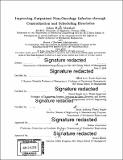| dc.contributor.advisor | Retsef Levi and David Simchi Levi. | en_US |
| dc.contributor.author | Marshall, Adam Ryan | en_US |
| dc.contributor.other | Leaders for Global Operations Program. | en_US |
| dc.date.accessioned | 2016-09-13T19:23:53Z | |
| dc.date.available | 2016-09-13T19:23:53Z | |
| dc.date.copyright | 2016 | en_US |
| dc.date.issued | 2016 | en_US |
| dc.identifier.uri | http://hdl.handle.net/1721.1/104307 | |
| dc.description | Thesis: M.B.A., Massachusetts Institute of Technology, Sloan School of Management, 2016. In conjunction with the Leaders for Global Operations Program at MIT. | en_US |
| dc.description | Thesis: S.M. in Engineering Systems, Massachusetts Institute of Technology, Department of Mechanical Engineering, 2016. In conjunction with the Leaders for Global Operations Program at MIT. | en_US |
| dc.description | Cataloged from PDF version of thesis. | en_US |
| dc.description | Includes bibliographical references (pages 117-119). | en_US |
| dc.description.abstract | The use of highly effective intravenously infused specialty drugs has increased significantly over the past two decades as they have led to dramatic improvements in patients' quality-of- life. At Massachusetts General Hospital, these drugs are administered in ten independent outpatient clinics. While some clinics only need to offer sporadic treatments and have low utilization of resources, other clinics find patient access is severely limited due to high utilization, poor scheduling practices, and inadequate staffing. This thesis describes methods to increase patient access to infusion while improving resource utilization. Underlying this improvement is a specially developed scheduling algorithm that smooths chair utilization while permitting flexible, multi-day scheduling. By employing the new scheduling algorithm, the recommended centralized infusion unit will be able to provide more expedient care, offer emergent appointments, avoid unnecessary hospital infusion admissions, and make more efficient use of clinical resources. Adding only two days of flexibility to appointments reduces resource requirements by up to 57%. Also, the day-to-day variability in patient volume is stabilized. Finally, the centralization of administrative resources ensures efficient prior authorization processing, leading to significant financial savings. | en_US |
| dc.description.statementofresponsibility | by Adam Ryan Marshall. | en_US |
| dc.format.extent | 119 pages | en_US |
| dc.language.iso | eng | en_US |
| dc.publisher | Massachusetts Institute of Technology | en_US |
| dc.rights | M.I.T. theses are protected by copyright. They may be viewed from this source for any purpose, but reproduction or distribution in any format is prohibited without written permission. See provided URL for inquiries about permission. | en_US |
| dc.rights.uri | http://dspace.mit.edu/handle/1721.1/7582 | en_US |
| dc.subject | Sloan School of Management. | en_US |
| dc.subject | Mechanical Engineering. | en_US |
| dc.subject | Leaders for Global Operations Program. | en_US |
| dc.title | Improving outpatient non-oncology infusion through centralization and scheduling heuristics | en_US |
| dc.type | Thesis | en_US |
| dc.description.degree | M.B.A. | en_US |
| dc.description.degree | S.M. in Engineering Systems | en_US |
| dc.contributor.department | Leaders for Global Operations Program at MIT | en_US |
| dc.contributor.department | Massachusetts Institute of Technology. Department of Mechanical Engineering | |
| dc.contributor.department | Sloan School of Management | |
| dc.identifier.oclc | 958278316 | en_US |
